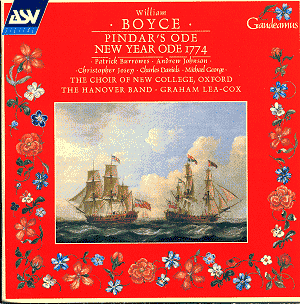William Boyce, who to this reviewer has always seemed
to be an undoubted master of British music, is satisfyingly emerging from
the doldrums to which so many commentators on British musical history
once contemptuously consigned him. They seem to have been, anxious to
"prove" their contention that nothing worthwhile emerged from
our native composers between Purcell and Parry, if not Elgar.
Our knowledge of Boyceís music has been substantially
extended by ASVís admirable Gaudeamus series which has revived several
of his odes. Sadly, this is the last in the series. Boyce put much of
his compositional energy into royal odes for the monarchís birthdays
and for the New Year. These usually had just one performance. Some of
their excellent overtures were recycled by Boyce and others have been
revived during the last two generations. One of the later odes appears
on this CD; more of that in a moment. At least the Pindarís Ode,
from much earlier in Boyceís career, had two performances. It exists
in two different versions: one for the first (London), performance and
a later one in Dublin in 1744, just two years after the premiere there
of Handelís Messiah. It is that latter one that is recorded here.
Its revisions took account of the resources available in Dublin, in
particular the tenor John Church, who had an astonishing vocal range,
replicated here by the Australian high tenor Christopher Josey in two
memorable arias. Charles Daniels, a more orthodox tenor, also excels
in some fine music, especially the arioso "In Fires of Hell"
immediately followed by the aria "Angry Flames" in both of
which the orchestral accompaniment underlines the text strikingly. The
St. Paulís chorister Patrick Burrows does well in his one aria near
the beginning. The admirable Michael George is heard in a gorgeous air,
"The Pious Mariner" and in an extended duet with Mr Daniels.
The New College Choir sing briskly in two choruses, the first of which
is twice repeated after intervening solo items. The other, which closes
the Ode, in the form of a prelude and fugue, is one of which Handel
would not have been ashamed.
The Hanover Band excel themselves. The overture will
be familiar in its later versions as No. 7 of the Eight Symphonies (1760),
edited in the 20th Century by Constant Lambert (a great admirer
of Boyce at a time when few were) and others. The New Year Ode 1774
comes from late in Boyceís career and does show, especially in the
two movement overture, his at least partial receptiveness to new compositional
ideas. Remember that by 1774 Haydn and Mozart had written symphonies
which are in the repertory today. Messrs George, Josey, Daniels and
Burrows again appear, more briefly but still with distinction. Another
St Paulís treble, Andrew Johnson, receives more exposure in his attractive
aria than Burrows does in his Ode. Mr George is particularly impressive
in his solo contribution which passes seamlessly from recitative to
arioso. The New College Choir satisfyingly rounds off the Ode with a
rousingly patriotic chorus.
Our deepest gratitude must however go to the conductor
Graham Lea-Cox for his faith in, and his advocacy for, this fine music.
The recording is excellent; and the booklet prints the words of both
Odes. Highly recommended.
Philip L Scowcroft
See also review
by Jonathan Woolf


![]() See
what else is on offer
See
what else is on offer 